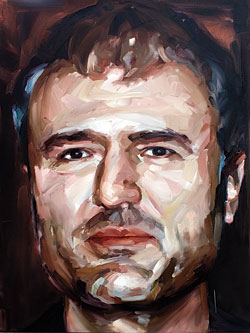 |
Painting by Nick Lepard
|
Nick Denton has built a panopticon. From his living-room window, he can all but see his favorite table at Balthazar, and his favorite table at Balthazar is picked for optimum surveillance of the room that surrounds it. The headquarters of Gawker Media, Denton’s nine-blog empire of barbed news and gossip sites, stands four blocks to the east, its roof terrace affording a panoramic view of the city. Yet all this omnividence goes two ways: Just as Denton seems to be watching every powerful figure in New York, every powerful figure in New York seems to be watching him. Not that Denton is ducking people. His life, online and off, is as permeable as that of anyone who gets into Gawker’s crosshairs. Write him at nick@gawker.com, poke him on Facebook, at-reply to @nicknotned on Twitter, and he will probably answer.
Eight years into Gawker Media’s existence, the standard line on Denton is still that he’s an outsider of sorts, a rude alien come to torment—and supplant—media civilization as we know it. If you’re Bill Keller, say, or Tina Brown—whose Daily Beast gets one-tenth of Gawker Media’s readership on a good month—it’s much easier to view Denton as an upstart thug from nowhere, as opposed to an equal who’s kicking your ass. That plays directly into Denton’s strategy: Thuggish is the reputation he wants. “If I am a cornerstone of the new Establishment, then there is no new Establishment worth talking about,” he says. “The only interesting people are on the West Coast,” he adds, then launches into a series of classic shameless Gawker riffs on the old New York media titans. “People used to quake when Barry Diller picked up the phone. Now he’s laughable. That image of Murdoch dyeing his hair in the sink is indelible—though the coloring may not be. Sumner Redstone would only be of interest to Gawker readers if he were to soil his adult diapers—on-camera. But the hard truth is that the golden age of New York media is largely over.”
Here’s another hard truth: Denton himself has become more of a mainstream media baron than he admits. These days, Gawker Media’s blogs net up to 17.5 million U.S. visitors per month, making the company America’s 45th most popular online property, well ahead of nytimes.com (55) or TMZ.com (59). Gawker Media grew through the annus terribilis of 2009. It grew in 2010. The U.S. readership figures of Gawker (gossip), Jezebel (women’s issues), Gizmodo (gadgets), Jalopnik (cars), Lifehacker (geek advice), and even Kotaku, Denton’s relatively low-key gaming site, are each up by 30 to 60 percent so far this year. The audience of the sci-fi blog i09 has more than doubled. It should tell you something that the straggler of the group is the company’s sole porn blog, Fleshbot.
Denton has been celebrated at Davos, has spoken at Murdoch’s exclusive retreat, and chatted with George Soros at a White House Correspondents’ Dinner. His Oxford mates have worked themselves into the upper reaches of British politics. And, shock of shocks, the man who has made his name by skewering traditional media outlets has several friends from the New York Times.
Denton will laugh all of that off, just like he did a 2007 assessment by the Sunday Times of London that estimated his worth at about $250 million. (A friend surmised that the paper was off “by a factor of ten” at the time, although Denton may be closer to that number now.) And no, Gawker Media is still not News Corp. But in a world full of old-media businesses blindly thrashing around the web, Denton is a man who has unequivocally figured things out—and made a fortune doing so. Not that he invented a new medium so much as reinvent an old one. Like all new-media types, Denton has said that in the future magazines will look more like websites. But he has also said that websites will look more like magazines (and eventually TV). Gawker Media has done exactly that. Gawker.com, its flagship property, owes at least as much to the “smart tabloid” model Tina Brown built at Vanity Fair as Brown’s website owes to Gawker. Gawker and the other sites also contain elements of familiar print brands from the New York Observer to Spy to the New York Post. After eight years of fretting about the coming bloggy anarchy, the most powerful person to emerge in that world is, ironically enough, a cozy archetype—a Fleet Street–minded New York Brit. Denton isn’t just an heir to Rupert Murdoch, Anna Wintour, Harry Evans, Tina Brown, and other ostensible Gawker targets; he’s become their peer.
London, 1966: the apex of Mod, the year of Twiggy and Blow-Up. The neighborhood into which Nick Denton was born, Hampstead, was the citadel of the moneyed liberal intelligentsia, posh but not stuffy. In retrospect, it was the perfect place for Marika Marton to have ended up. Marton (whose son strikingly resembles her) had escaped the Soviet invasion of Hungary just ten years prior, in 1956. A woman of formidable intellect, she spoke Russian, German, and Latin in addition to English and her native Hungarian, and began studying economics—first at London University, then at Southampton—almost immediately after immigrating. At the second school, she fell in love with her economics professor, Geoffrey Denton.
From the outset, their son Nick found himself in a near-bespoke environment of cosmopolitan cool, where his kinds of otherness—Jewish, Hungarian—made him blend in rather than stand out. So it was with the private school he attended, University College School, which placed little value on family crests but sent yearly waves of graduates to Oxford and Cambridge. Which is what happened to Denton.

